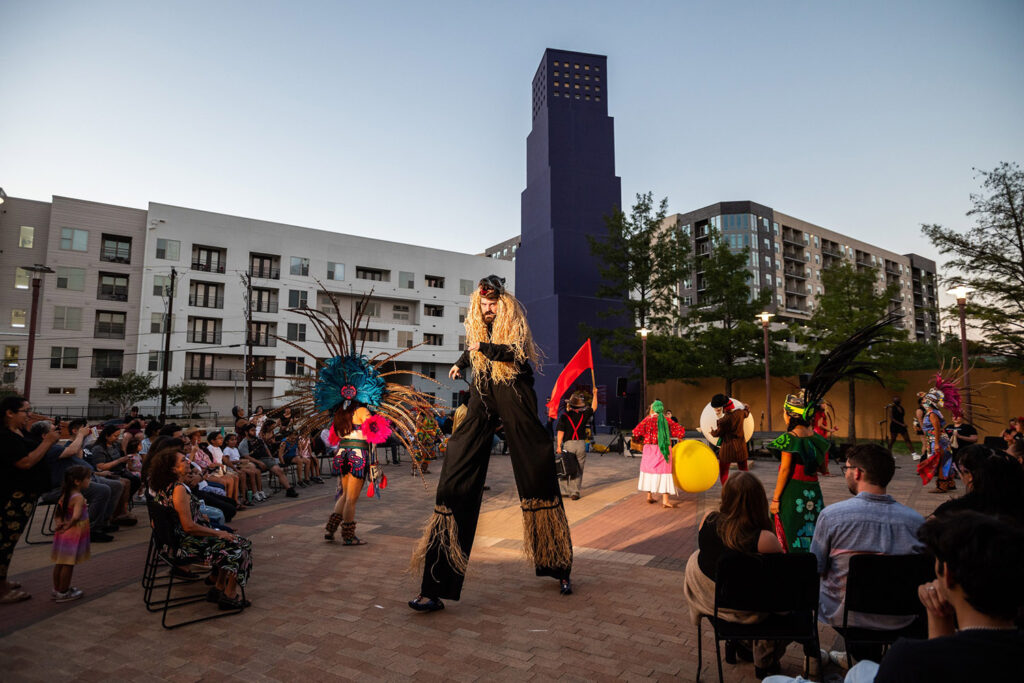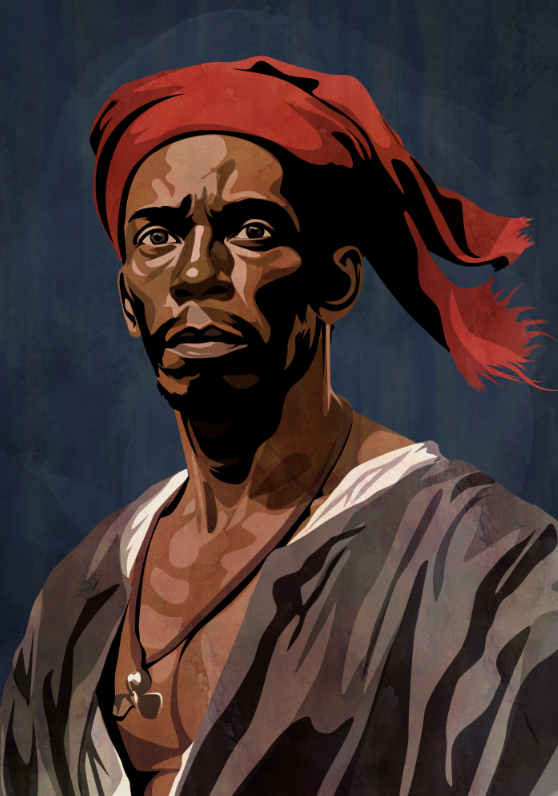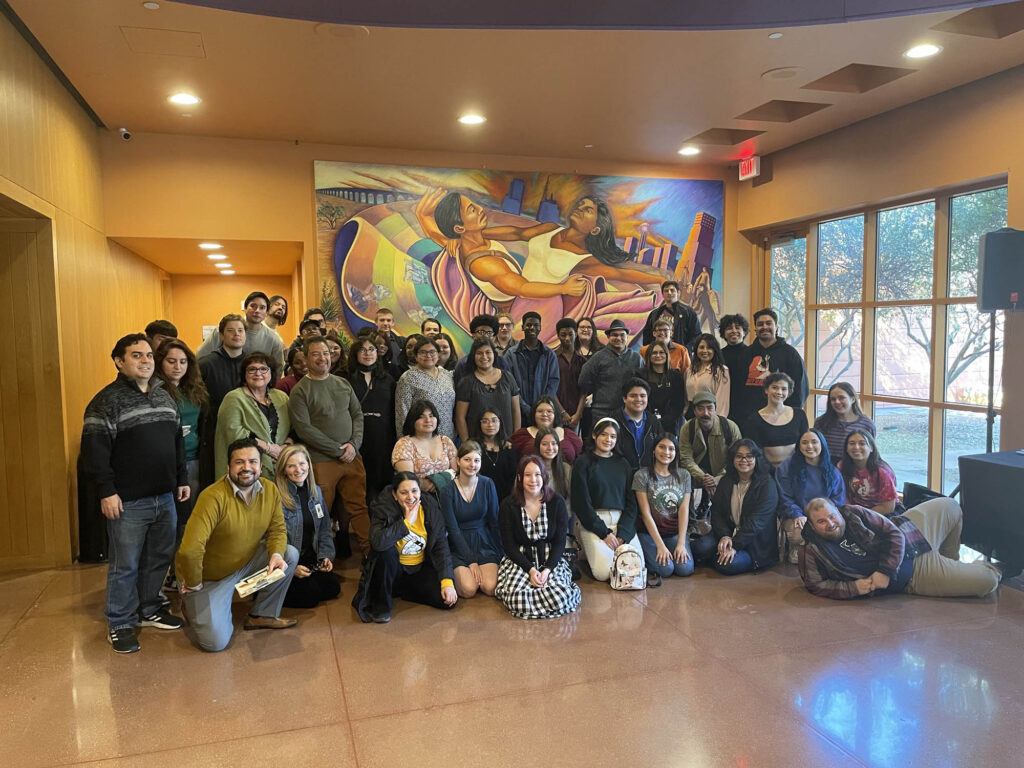Story and video by Lawson Martin. Photos provided by Cara Mía Theater.
Eliberto Gonzalez opened Cara Mía Theatre in 1996 because he believed that Chicano literature and its writers should be more accessible to the general public. The theatre company created an outlet for the Mexican-American experience to be brought to Dallas stages.
When David arrived at Cara Mía Theatre in 2002, the theatre’s cultural reach expanded even further, as he found it essential to include Latino and not just Mexican-American plays among the theatre’s seasonal lineup.

“That meant we were going to tell stories that represented people with roots from Latin America,” David says. “To include these incredible cultures, we expanded our storytelling.”
As the theatre’s executive artistic director, David also wanted to broaden the company’s audience among non-theatre-going Latinos, so he decided to concentrate on crafting fresh bilingual plays that were both relevant and artistically distinctive.
Throughout the past 25 years, the theatre has grown into the largest Latinx theatre in Texas, serving as a hub for artists from around the United States and Mexico. Cara Mía Theatre is one of the few Latinx theatres nationwide that stages four to five mainstage productions per season.
According to David, Cara Mía Theatre has continuously presented theatrical works that resonate with universal human values, and the theatre continues to strive to amplify the voices of communities of color.
“It was really important for us early on to identify what our interests were as artists that can resonate with the interests of the communities,” David says. “And that’s really how we started building our voice artistically.”

Cara Mía Theatre partners with people from all over, including theatre companies in Mexico, groups in Dallas, and artists and organizations from around the United States. The selection of plays each season is primarily determined through these partnerships.
For instance, David shares about a theatre company they partner with in Tucumán, which is in the Mexican state of Morelos, and centers on the Afro-Mexican experience. One of their productions, “Yanga,” tells the story of an African prince who led a rebellion in 15th-century Mexico. This narrative highlights the longstanding presence of Afro-Mexicans and Afro-Latinos across the Americas.

“So we engage with these unique partners throughout the western hemisphere, and we determine these unique topics and themes that we can uplift and then explore as artists,” David says. “Then we can take them out into the community and schools.”
According to David, each play typically includes an educational component for schools across the Dallas Metroplex and a community engagement aspect.
Cara Mía Theatre’s educational programs for kids include after-school residences, in-school and virtual bilingual touring productions, and on-site field trip performances at the Latino Cultural Center.
“It’s important that students experience these kinds of stories,” David says. “In the case of ‘Yanga,’ many students may not even be aware that Afro-Mexicans exist.”
David says many Latino history and expressions of Latino cultures are not understood nor taught, so Cara Mía Theatre “assumes that responsibility joyfully” and shares it with educators. Leaders at Cara Mía Theatre make it easy for educators to teach their students about Latino culture by creating digital pre-made lesson plans that meet Texas state standards for them to use with their students.
“It allows us to tell these stories in schools further and to help the teachers move through a lot of the red tape to present these stories,” David says.

Cara Mía Theatre’s culturally specific educational programs for youth and educators now reach 20,000 to 30,000 youth annually. Leaders hope they will be able to reach 60,000 youth each year in the future, which is why they’ve set up The Transformation Fund, a three-year capacity campaign to continue building up Cara Mía Theatre as a national destination for Latinx theatre.
David believes it’s vital for students and the entire community to learn about Latino culture. He says storytelling is deeply ingrained in our human nature, with a compelling story having the power to captivate anyone. Dramatic storytelling is woven into our DNA, drawing our attention to the narrative making theatre an essential and influential outlet.
David feels compelling stories have a universal appeal, transcending cultural boundaries. However, there’s also value in culturally specific stories, as they may resonate deeply with individuals from that culture while still being relatable to others.
“We’re understanding that it’s not just the play, but it’s also the community experiences around the play, the educational experiences, the musical concerts that take place outdoors at the Latino Cultural Center on a beautiful summer night or a meal that takes place after a community conversation,” David says.
David says these experiences are similar to the richness of travel experiences. These shared moments form bonds, cultivating compassion and connection, ultimately building a community beyond the realm of theatre.
Additionally, David believes it is crucial to understand what it means to be an immigrant. As a Mexican-American with roots in Texas dating back to the 1800s, David asserts that being a human inherently involves a desire to explore and relocate, which he says makes everyone, in a sense, an immigrant.
David praises contemporary Latin American immigrants for undertaking journeys similar to our ancestors as they acquire unique and invaluable experiences.
“It’s those who travel who have the riches that anyone else cannot replicate. And they carry experiences that make them extraordinary human beings,” David says.
David rejects the stigmatization of immigrants, particularly Latino and Latin American immigrants, viewing them as some of the most remarkable individuals due to their courageous journey. This perspective goes along with Cara Mía Theatre’s mission of highlighting the strength and resilience of Latin Americans.
Individuals can support Cara Mía Theatre by buying tickets to its plays or contributing to its programs. People are also invited to the theatre’s community events, which take place alongside every theatre production.
“Our vision is to unite all people through Latinx theater, so we’re looking to create a place where everyone belongs,” David says. “Our work can be challenging, but we’re still looking to find that common humanity. So I would invite people to come and experience our work and, more importantly, experience the people.”
Sign up with your email address to receive good stories, events, and volunteer opportunities in your inbox.